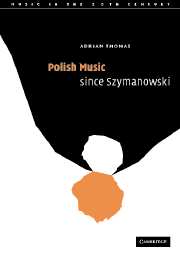Book contents
- Frontmatter
- Contents
- List of musical examples
- Preface
- Acknowledgements
- List of abbreviations
- Part I The captive muse
- 1 Szymanowski and his legacy
- 2 The Second World War
- 3 Post-war reconstruction
- 4 Socialist realism I: its onset and genres
- 5 Socialist realism II: concert music
- Part II Facing west
- Part III The search for individual identity
- Part IV Modernisms and national iconographies
- Part V Postscript
- Appendix 1 Cultural events in Poland, 1953–6
- Appendix 2 ‘Warsaw Autumn’ repertoire, 10–21 October 1956
- Appendix 3 ‘Warsaw Autumn’ repertoire, 1958–61
- Appendix 4 Selected Polish chronology (1966–90)
- Notes
- Select bibliography
- Index
2 - The Second World War
Published online by Cambridge University Press: 22 September 2009
- Frontmatter
- Contents
- List of musical examples
- Preface
- Acknowledgements
- List of abbreviations
- Part I The captive muse
- 1 Szymanowski and his legacy
- 2 The Second World War
- 3 Post-war reconstruction
- 4 Socialist realism I: its onset and genres
- 5 Socialist realism II: concert music
- Part II Facing west
- Part III The search for individual identity
- Part IV Modernisms and national iconographies
- Part V Postscript
- Appendix 1 Cultural events in Poland, 1953–6
- Appendix 2 ‘Warsaw Autumn’ repertoire, 10–21 October 1956
- Appendix 3 ‘Warsaw Autumn’ repertoire, 1958–61
- Appendix 4 Selected Polish chronology (1966–90)
- Notes
- Select bibliography
- Index
Summary
With Hitler's invasion on 1 September 1939, Poland's two decades of independence came to an abrupt halt. Over six million Poles lost their lives during the Second World War – almost twenty per cent of the population. Quite apart from the terror of everyday life, with its street seizures and summary executions, the ghettoisation and persecution of the Jewish population and the ruthless murder and deprivation carried out in the concentration camps, any expression of Polishness could prove fatal. Polish institutions and organisations were liquidated by the occupying Nazi forces. An early signal of German intent was a summons to leading academics of the Jagiellonian University in Kraków to attend a meeting on 6 November 1939: the 183 professors who turned up were immediately imprisoned and sent to the Sachsenhausen concentration camp.
The Germans were determined to eradicate the Polish nation, although they can hardly have been surprised that, as already shown by nineteenth-century insurrections against occupying powers, Poles should now demonstrate equally incredible and sometimes foolhardy bravery in defending their nationhood. A Polish resistance movement, known as the Home Army (AK – ‘Armia Krajowa’), was immediately mobilised and Poles created for themselves ‘a State within a State’. As Adam Zamoyski relates:
The life of the nation was lived in hiding. For a period of six years, education at every level was carried on secretly in indescribable conditions. Bombs were manufactured, plays were staged and books were published under the nose of the Germans, and hardly a national holiday passed without the Polish national anthem and God Save the King being broadcast all over the city [Warsaw] through the official German megaphone system. The whole spectrum of activities was carried out with an efficiency and wit that tend to obscure the difficulties and dangers involved. Torture, concentration camp and death awaited anyone on whom German suspicion fell.
- Type
- Chapter
- Information
- Polish Music since Szymanowski , pp. 16 - 25Publisher: Cambridge University PressPrint publication year: 2005



